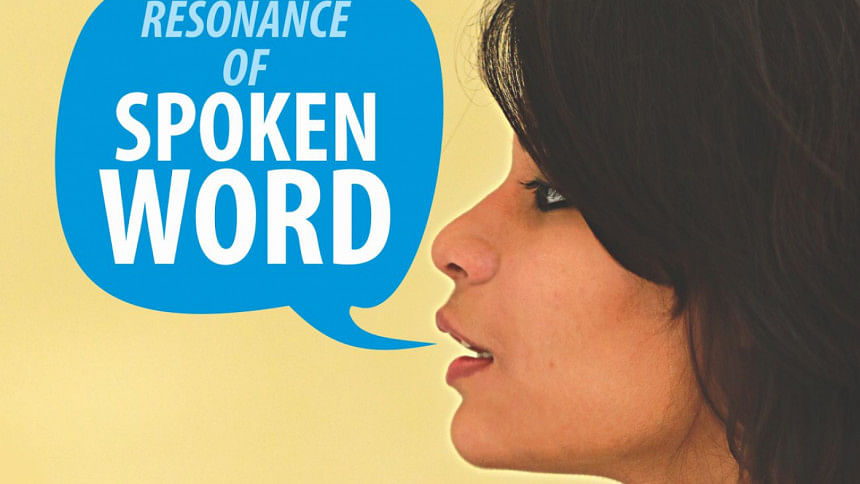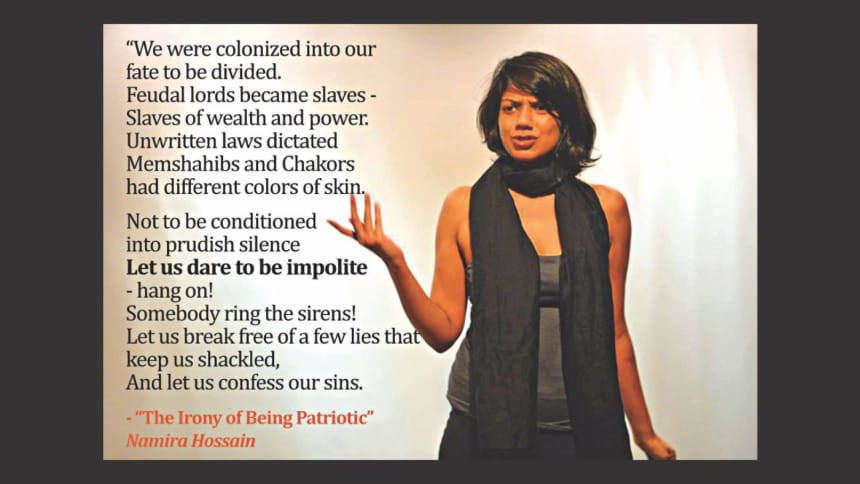Resonance of Spoken Word

"…For we will keep on rising, rising along the growing warmth and intensifying light
As the symphony reaches its illuminating ZENITH
AND WE WILL KNOW, AND WE WILL FEEL
THAT THIS MOMENT IS OURS TO LIVE FOR
THIS MOMENT IS WHAT WE WERE BORN FOR
THIS MOMENT IS THE PEAK OF OUR EXISTENCE -"
BANG!
Shakil Ahmed crashes to the floor, struck silent at the boom of the (staged) gunshot. Remaining spread-eagled on the ground, he continues to recite; "As this symphony slows down, we will ask ourselves – what, what becomes of us now?"

He talks of thoughts that squint, hear and feel; in front of him, a sight seldom seen in Dhaka prevails – mobile phones silenced and voices muted, a tentful of young spectators drink in the poetry taking life on stage. They listen, they relate, they appreciate.
Appreciation of poetry and other literary endeavours has long been sparse among Dhaka's general public. But the crowds gathered at last year's performances of Ampersand – a group of spoken word artists in Dhaka – sheds light on how the phenomenon of 'Spoken Word' does a delightful job of taking poetry to regular people, even in Dhaka.

The practice of verbal story-telling or social commentary is said to have been prevalent since Homer, followed by the eras of Shakespeare, Dadaism, Surrealism, beat poetry and the birth of slam poetry in 1986. Alternatively, beginnings of oral tradition can be traced back to a variety of cultures – ranging from the African, Caribbean, and North American Aboriginal to the Islamic and Celtic. In our own country, "Kobir Lorai" and "Kobita Abritti" have long been parts of folk and literary traditions.
Over the course of its journey, poetry has become a powerful vessel of human emotions and histories – one that needs to be looked into. It has gained complexity and depth as it rose in stature, but along the way lost grip on many hearts due to its lack of comprehensibility. Spoken word breaks through those intimidating barriers and brings to us verse that is relatable and easy to understand.
By definition, it encompasses all spoken forms of poetry including jazz, slam, and dub, hip hop, sound; and folk. The essence of spoken word lies not in trying to make people decipher hidden meanings using metaphors and literary jargon; instead it coaxes us to think of ideas, feelings and social dynamics that we know and care about, with renewed focus.

Just a few years ago, watching spoken word performances would have been an alien concept to the people of this country. But like everything else the internet brings to our doorsteps from around the world, this too is slowly gaining recognition. As more and more people discover this form of art – one that does not require us to read between the lines but to just listen and feel – spoken word continues to speak to a larger number.
"I was recently introduced to the poetry of Sarah Kay and Phil Kaye through YouTube by a friend," shares Ashraful Ashik, a student of Finance at North South University who had harboured no interest in poetry before. "It was quite beautiful and very relaxing. If I ever get the chance to experience spoken word poetry sessions in Dhaka, I would definitely love to see for myself if they are as beautiful as the ones that I watched online."

Lamisa Saadat is a Business student at the same university, but one who takes interest in literature. "I enjoy spoken word poetry because I feel like it's raw and straight from the heart. People can relate to the poetry and the poets themselves. And having spoken word performances (in Dhaka) would open up a platform for many who wish to express themselves. It would also help bring together people of the same as well as of different mindsets. I believe connecting with people through poetry would get us talking and relating to each other somehow," she explains.
Interestingly, that is precisely what happened when a group of writers came together under the name of Ampersand, with the view to building a community of creative self-expression. Co-founded by Dhaka Tribune reporter Syeda Samira Sadeque and wellness coach Ashna Chowdhury, Ampersand concocts a vibrant mix of 11 people from different fields: architect Nafis Salman, literary editor Shehzar Doja, accountant David Browne, teacher and actor Shaan Rahman, writer Taufiq Sufi, comedian and businessman Shammi Huda, energy and infrastructure specialist Irfan Ahmed, journalist Namira Hossain and education specialist Shakil Ahmed.

Their first performance was at Longitude Latitude 6 (Banani, Dhaka) in September 2015, followed by the second one on October 3, 2015 at the "100 Thousand Poets for Change" event held at Red Shift Café (Gulshan, Dhaka). The impressive turnout, the emotionally-charged atmosphere and the response from the open-mic sessions were a testament to the unexpected success of the events.
More recently, multiple award-winning Malaysian-Australian spoken word artist and rapper Omar Musa conducted a spoken word workshop here in Dhaka on February 5, 2016.
Nicholas Murray and Rosina Kazi from Lal, Toronto, held a two-hour workshop combining sound making, creative writing and recording on February 13, 2016. They worked in groups with participants to create and weave different stories through a collective sound circle that was recorded and the copies presented to participants.

"We felt the need for creative space was missing in Dhaka, and when Ashna Chowdhury approached me with the idea, I was immediately on board," recalls Syeda Samira Sadeque, one-half of the brain-child behind Ampersand's creation. Looking back on the humble beginnings of what started out as a writing group in March last year, Samira recollects the first few meetings; they would gather once every two weeks to share pieces varying from prose, poetry and excerpts from novels they were working on. "Soon," she explains, "we began conducting our own writing exercises. We realised both our needs and knack for expression of our pieces in the form of spoken word, and shifted to that form."
The pieces performed by each of the group's members have covered a variety of subjects ranging from love, identity crises and plights of womanhood to the ironies of patriotism.
"We've had many people come to our show who say they "don't get poetry" but have been moved by the pieces we share," says Samira. "That's because spoken word in general doesn't always have the techniques or vocabulary use as traditional poetry. It's more interactive, simple, grounded and speaks to the common people."

"I think spoken word in Bangladesh could play a big role in bringing people close to poetry and literature – even those who say they "don't get poetry," she predicts.
Two of the most popular and well known of today's spoken word artists are the aforementioned New York based Sarah Kay and Phil Kaye, partners and best friends. With faces and hands that act out entire stories, they speak their poetry more than they recite; it is a true pleasure to watch them perform.
In a poem that starts with "If I should have a daughter…" Sarah Kay says that "I want her to know that this world is made of sugar: it can crumble so easily, but don't be afraid to stick your tongue out and taste it." The lines seem equally reflecting of what spoken word accomplishes – giving us glimpses into the complex world around us in minuscule doses. These are doses that allow us to understand the world just a little bit better, by tasting them through poetry; and poetry, even in snippets, inspires as much as it informs. It gives birth to ideas.
PHOTOS: TAUFIQ SUFI

 For all latest news, follow The Daily Star's Google News channel.
For all latest news, follow The Daily Star's Google News channel. 



Comments